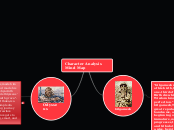jonka Grace Baker 8 vuotta sitten
605
Grace Baker - Character Analysis Mind Map

jonka Grace Baker 8 vuotta sitten
605

Lisää tämän kaltaisia
"Go up, Ur-Shanabi, pace out the walls of Uruk. Study the foundation terrace and examine the brickwork. Is not its masonry of kiln-fired brick? And did not seven masters lay its foundations? One square mile of the city, one square mile of gardens, one square mile of clay pits, a half square mile of Ishtar's dwelling, Three and a half square miles is the measure of Uruk!" - The Epic of Gilgamesh. Gilgamesh says this to Ur-Shanabi at the very end of the story. After all he's lost, he realizes that Uruk is the remedy for his problems.
"He who saw the wellspring, the foundations of the land. Who knew the ways, was wise in all things..." The Epic of Gilgamesh. This is the narrator speaking in the beginning of the story about Gilgamesh becoming wise and building Uruk.
2. "[Melanthios] recklessly lashed out with his heel to the hip, but failed to knock him out of the pathway, for Odysseus stood it, unshaken, while he pondered within him whether to go for him with his cudgel, and take the life from him or pick him up like a jug and break his head on the ground. Yet still he stood it, and kept it all inside him." - The Odyssey. Here, we see Odysseus keeping in his anger.
"Take my hand, my friend, let us walk on together! Your heart should be urging you to battle. Forget about death, He who marches first, protects himself, Let him keep his comrade safe!" - The Epic of Gilgamesh. Just before the battle with Humbaba, Gilgamesh gives his best friend, Enkidu, a daring and bold speech about being brave.
"Lording it like a wild bull, his head thrust high. The onslaught of his weapons had no equal. His teammates stood forth by his game stick, He was harrying the young men of Uruk beyond reason. Gilgamesh would leave no son to his father, Day and night he would rampage fiercely." - The Epic of Gilgamesh. This quote from the story is in beginning, when the people cried to the god's because their leader, Gilgamesh, would harass the young men and women of Uruk for his own pleasure.
"He who saw the wellspring, the foundations of the land, Who knew the ways, was wise in all things" - The Epic of Gilgamesh. Gilgamesh is praised for using his wisdom and understanding when building Uruk.
"Speak, Memory - Of the cunning hero, the wanderer, blown off course time and again after he plundered Troy's sacred heights." - The Odyssey. This is the first line in book I of The Odyssey, recognizing Odysseus as a hero.
"Cyclops, if anyone, any mortal man, asks you how you got your eye put out, tell him that Odysseus the marauder did it, Son of Laertes, whose home is on Ithaca." - The Odyssey. In this situation with the Cyclops, Odysseus is taken away by his pride and gives the Cyclops his name. Most of the tragic events on Odysseus' journey are caused by his show of pride with the Cyclops.
"Then I went down the rows and smeared the wax into all my men's ears. They in turn bound me hand and foot upright to the mast, and then sat down and beat the sea white with their oars." - The Odyssey. In order to escape the seductive Siren's song, Odysseus cunningly orders his men to put wax in their ears and to tie him down.
"Gilgamesh was singled out from the day of his birth, two-thirds of him was divine, one-third of him was human! The Lady of Birth drew his body's image, The God of Wisdom brought his stature to perfection." - The Epic of Gilgamesh.
"Then Athena, born from Zeus, made him look taller and more muscled and made his hair tumble down his head like hyacinth flowers.... So Athena herself made Odysseus' head and shoulders shimmer with grace."